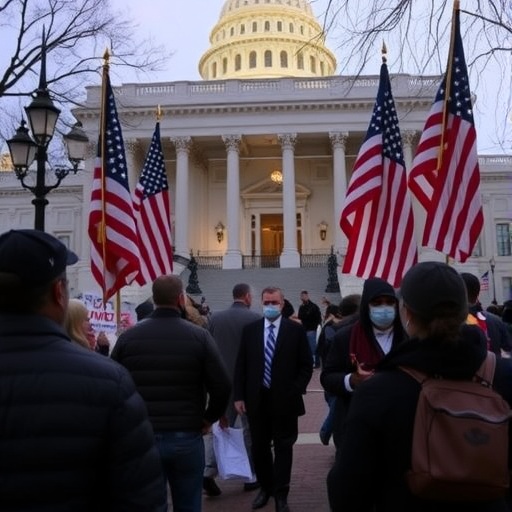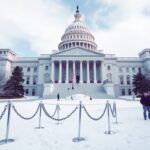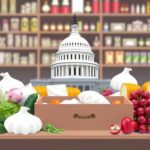Senate Vote Fails: Federal Workers Face Uncertain Paychecks in Prolonged Government Shutdown
In a stunning blow to millions of Americans relying on stable government jobs, the U.S. Senate on Thursday fell short in its bid to pass a funding bill aimed at ensuring pay for federal workers during the ongoing government shutdown. The measure, which garnered 55 votes in favor, missed the 60-vote threshold needed to overcome a filibuster, leaving essential employees in a financial limbo as the shutdown stretches into its third week.
- The Pivotal 55-45 Vote: A Narrow Defeat in the Senate Chamber
- Federal Workers on the Brink: Personal Stories Amid the Shutdown Squeeze
- Political Fault Lines: Why the Funding Bill Couldn’t Bridge the Divide
- Economic Ripples and Community Strain: Shutdown’s Hidden Costs
- Path Forward: Negotiations Heat Up as Pressure Mounts on Lawmakers
This failure highlights the deepening partisan rift in Washington, where budget disputes over border security and spending priorities have paralyzed federal operations. Federal workers, from air traffic controllers to park rangers, now brace for missed paychecks that could ripple through local economies nationwide.
The Pivotal 55-45 Vote: A Narrow Defeat in the Senate Chamber
The Senate’s attempt to advance the funding bill unfolded with high drama on the chamber floor, where lawmakers debated for hours before the procedural vote. Tabled as S. 423, the legislation sought to appropriate emergency funds to cover salaries for approximately 800,000 federal workers deemed essential during the shutdown. Sponsored by a bipartisan group led by Senate Majority Leader Chuck Schumer (D-NY), the bill promised back pay once normal operations resumed but focused immediate relief on those required to work without compensation.
With a tally of 55-45, the vote exposed stark divisions. All 50 Democrats present supported the measure, joined by five Republicans including moderates Susan Collins (R-ME), Lisa Murkowski (R-AK), and Mitt Romney (R-UT). However, the majority of GOP senators, citing concerns over unchecked spending and the need for comprehensive shutdown resolution, blocked progress. "This isn’t about denying workers their due; it’s about fiscal responsibility in a time of crisis," said Senate Minority Leader Mitch McConnell (R-KY) after the vote, emphasizing that piecemeal solutions undermine negotiations on the core issues.
Parliamentary rules requiring 60 votes for cloture meant the bill’s defeat was predictable yet painful. Witnesses in the gallery, including advocacy groups like the National Treasury Employees Union, expressed audible frustration as the gavel fell. This procedural hurdle, a hallmark of Senate filibuster traditions, has repeatedly stalled similar efforts during past shutdowns, underscoring the chamber’s role as a bottleneck in crisis response.
Federal Workers on the Brink: Personal Stories Amid the Shutdown Squeeze
For the roughly 2.1 million civilian federal employees across agencies like the Department of Defense, Homeland Security, and the IRS, the shutdown’s toll is deeply personal. Essential workers—those who must report to duty without pay—include over 400,000 from the Transportation Security Administration (TSA) alone, screening millions of travelers daily. "I’m showing up every day, ensuring airport security, but my family is dipping into savings just to buy groceries," shared TSA officer Maria Gonzalez in a recent interview with The Washington Post. Her story echoes thousands: delayed mortgages, strained childcare, and mounting credit card debt.
Statistics paint a grim picture. According to the Office of Personnel Management, the 2018-2019 shutdown—the longest in history at 35 days—cost federal workers an estimated $3.2 billion in lost wages, with many still recovering. This current impasse, triggered by disagreements over a $1.375 billion border wall allocation, has already furloughed 380,000 non-essential staff while forcing others to work unpaid. Food banks in D.C. report a 40% uptick in visits from government employees, and mental health hotlines note increased calls from affected families.
Beyond the beltway, the impact spreads. In rural Virginia, where the Pentagon employs thousands, local businesses like diners and gas stations see 20-30% revenue drops as workers tighten belts. "These aren’t just numbers; they’re neighbors skipping meals," said economist Dr. Elena Ramirez of the Brookings Institution, who estimates the shutdown could shave 0.1% off quarterly GDP if prolonged.
Political Fault Lines: Why the Funding Bill Couldn’t Bridge the Divide
The funding bill’s collapse stems from entrenched partisan battles that have defined the shutdown. At its heart lies President Donald Trump’s insistence on wall funding, opposed by Democrats who view it as wasteful amid broader immigration reform needs. The Senate vote became a microcosm of this deadlock: Republicans argued the bill would reward Democratic obstructionism without addressing root causes, while Democrats decried it as hostage-taking of workers’ livelihoods.
Key figures clashed publicly. Schumer lambasted the GOP for "prolonging suffering for political points," while House Speaker Nancy Pelosi (D-CA) vowed in a floor speech to pass companion legislation in the lower chamber. On the Republican side, Sen. Lindsey Graham (R-SC) warned that approving pay without resolution "sets a dangerous precedent, incentivizing future shutdowns." Bipartisan efforts, including a proposal from Sens. Collins and Joe Manchin (D-WV), aimed to decouple worker pay from budget talks but gained insufficient traction.
Historical parallels abound. During the 1995-1996 shutdowns under President Bill Clinton, similar pay bills faced resistance, leading to 17 days of closure and public backlash that pressured compromise. Today, polling from Gallup shows 53% of Americans blame congressional Republicans for the impasse, with approval for handling the shutdown at historic lows. Advocacy from groups like the Partnership for Public Service has flooded Capitol Hill with letters, yet the 60-vote barrier remains an insurmountable filibuster shield.
Economic Ripples and Community Strain: Shutdown’s Hidden Costs
Beyond federal workers, the shutdown’s economic fallout is vast and multifaceted. The Congressional Budget Office projects a potential $11 billion hit to the U.S. economy per week of closure, factoring in lost productivity, delayed contracts, and consumer spending dips. Small businesses near federal installations, such as those around NASA’s Goddard Space Flight Center in Maryland, report canceled orders and layoffs. One contractor, speaking anonymously to NPR, said, "We’re owed $500,000 in payments; without it, we might fold."
National parks, unmanned due to furloughs, lose $40 million daily in visitor spending, per the National Park Service—funds that support gateway towns like those in Yellowstone. Food inspection halts at the FDA have delayed imports, raising grocery prices, while IRS processing backlogs could delay tax refunds by months, affecting 150 million filers. In coastal states, Coast Guard operations strain without full staffing, heightening risks during hurricane season.
Social services feel the pinch too. Programs like Head Start, serving 1 million low-income children, face funding gaps, with 20,000 slots already cut. Women’s health clinics under the Department of Health and Human Services report appointment cancellations, exacerbating access issues. "The shutdown isn’t just closing doors; it’s closing opportunities for vulnerable populations," noted policy analyst Dr. Jamal Thompson from the Urban Institute, who tracks how such disruptions disproportionately affect minority communities with higher federal employment rates.
Internationally, the U.S. image suffers. Delayed passport processing has stranded Americans abroad, while embassy staffing shortages hinder diplomacy. Financial markets, though resilient, show volatility; the Dow dipped 1.2% on news of the Senate’s failure, per Bloomberg data.
Path Forward: Negotiations Heat Up as Pressure Mounts on Lawmakers
As the shutdown enters uncharted territory, eyes turn to potential breakthroughs. House Democrats plan to reintroduce the pay bill next week, possibly attaching it to a larger spending package. Bipartisan talks, mediated by Vice President Kamala Harris’s office, aim to find common ground on border security without wall specifics. "We’re close on many fronts; workers can’t wait," hinted Sen. Kyrsten Sinema (I-AZ), a key swing vote.
Public pressure is intensifying. Protests outside the Capitol drew 5,000 federal workers last weekend, chanting "Pay Us Now!" Unions threaten legal action, arguing the shutdown violates labor laws. Economists warn of a "shutdown fatigue" that could erode consumer confidence, with retail sales already down 2.5% in affected regions.
Looking ahead, resolution may hinge on midterm election dynamics, with vulnerable Republicans facing voter ire. If history is a guide—from the 2013 shutdown’s quick end after public outcry—compromise could come swiftly. For now, federal workers hold vigil, their paychecks a bargaining chip in America’s political chess game. As one park ranger in Yosemite put it, "We’re the ones keeping the lights on—it’s time Congress does the same for us."
This ongoing saga underscores the human cost of gridlock, urging lawmakers toward urgent action before the shutdown’s scars deepen.








